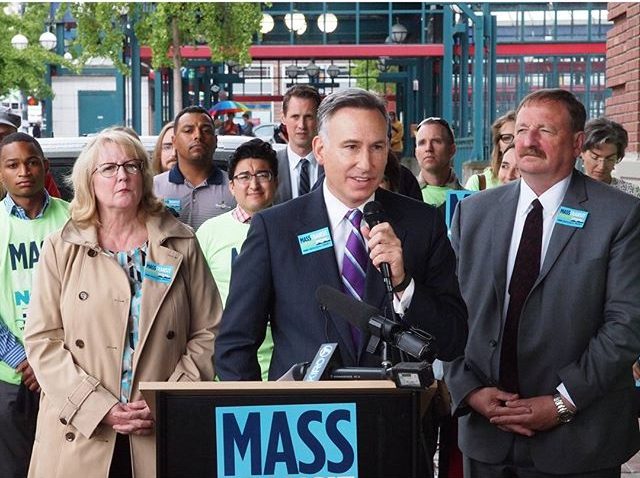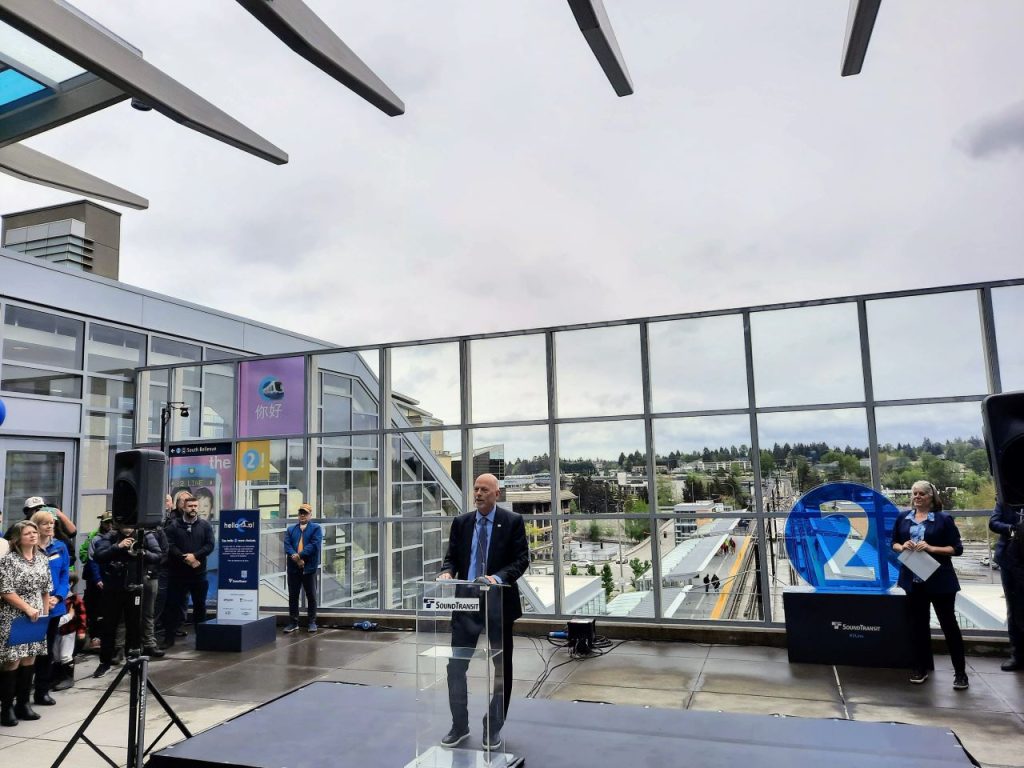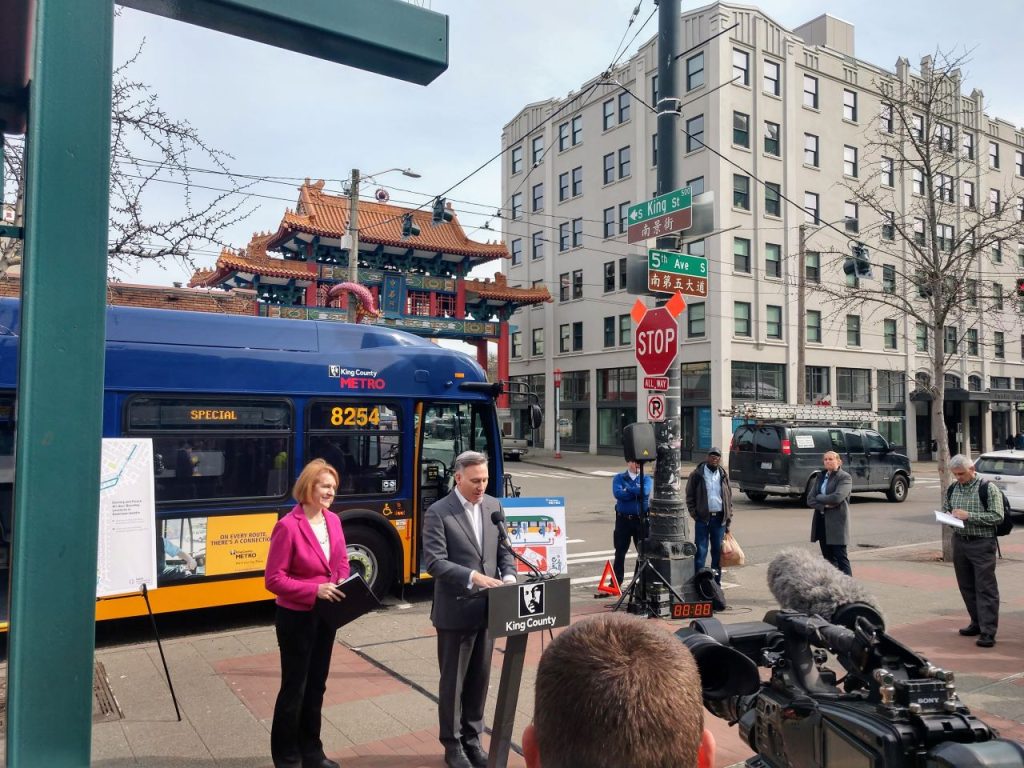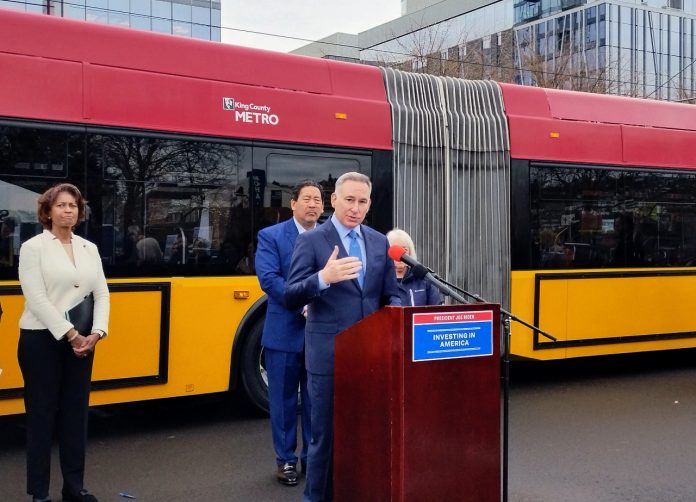The board hiring one of their own would be “massive breach of ethical standards,” Seattle Subway argued.
At a special meeting Friday, the executive committee of the Sound Transit Board of Directors dove into its CEO search and revealed it has winnowed the top candidates down to five, including one of their own. Following months of rumors, Sound Transit Boardmember Dow Constantine revealed he is pursuing the CEO job, shedding light on what he intends to do at the conclusion of his fourth term as King County Executive at year’s end — or potentially sooner.
The four other top candidates are executives at other transit agencies and their identities remain confidential at this point. Sound Transit has argued this is necessary to ensure good candidates can come forward without risking their current jobs. The board faces a quick timeline to install a new CEO since interim CEO Goran Sparrman has said he will retire on May 15 and not be talked into an another extension.
Sparrman’s timeline adds another complication if they select Constantine, who would either need to resign earlier to take the job or install another interim CEO to keep the seat warm for him.
Constantine announced in November that he would not seek a fifth term, and two King County Councilmembers who serve on the Sound Transit Board — Claudia Balducci and Girmay Zahilay — jumped into the race. Constantine has yet to endorse in that race, which will be decided in the November election.
The County Executive seat comes with automatic Sound Transit Board membership and the ability to appoint the County’s delegation on the board. Constantine has served as board chair during pivotal moments, such as putting Sound Transit 3 (ST3) measure on the ballot and shepherding it to passage in 2016 and overhauling the Ballard Link alignment in 2023, abandoning plans for a station near the heart of Chinatown and in Midtown.

The 2016 measure — billed as a $54 billion package at the time — is allowing Sound Transit to carry out one of the largest transit expansions in the country, rivaled only by Los Angeles. But ST3 projects have also been heavily delayed and are facing heavy criticism from transit advocates for routing decisions that could cost ridership and reduce the quality of transfers between transit lines.
After Constantine’s 15 years on the board, King County’s 10 members on the 18-member board are there because Constantine appointed them (or reappointed them in Pete von Reichbauer’s case). Critics argue this presents conflicts of interest, since King County’s members owe their board seat to Constantine, which makes it hard to make an objective decision and leads to perceptions of political patronage.
The grassroots transit advocacy group Seattle Subway has come out against appointing Constantine as the agency’s CEO.
“Selecting any current board member as CEO would be a massive breach of ethical standards,” Seattle Subway spokesperson David Scott said during the Friday meeting’s public comment period. “The CEO will have to exercise great fortitude in standing up to this board, to ensure the user experience is not sacrificed for the sake of special interests.”

In addition to the ethical conflict, Seattle Subway has expressed doubts about the direction Constantine has been leading the agency, citing ongoing maintenance issues impacting service quality. The group has also criticized alignment decisions, such as skipping Chinatown and Midtown with the Ballard Link extension, and ballooning ST3 project costs, as planning processes draw out and project scopes fail to tighten.
The new CEO will also be getting a big raise over Sparrman and his short-lived predecessor Julie Timm. Sound Transit’s public job listing shows a range of $450,000 to $650,000, which exceeds Sparrman’s $500,000 salary, and the recruiter is using an even higher $675,000 figure, Mike Lindblom wrote in the Seattle Times.
“The $675,000 anticipated salary appears on a Krauthamer invoice, released through a Seattle Times public records request,” Lindblom wrote. “The firm’s commission will be up to 30% of the CEO salary, with a limit of $220,000, its contract says.”

Timms’ hiring involved a secretive process with closed door meetings with stakeholders, who were pressed to sign non-disclosure agreements to participate. Sound Transit has yet to determine its process this time around, but it appears it has something similar in mind as it engages business, transit advocacy, government, tribal, labor, and social equity organizations.
Snohomish County Executive Dave Somers told Lindblom that details on how stakeholders might meet finalists and give input have not yet been determined and no plans yet exist for the general public to meet them before hiring. A total 60 people applied for the CEO position, advice from recruiting consultant Krauthamer & Associates winnowed that list to 15, and board members picked the last five, Somers added.
Constantine’s bid to helm Sound Transit will surely face hurdles of some variety in the coming months, one way or the other.
Doug Trumm is publisher of The Urbanist. An Urbanist writer since 2015, he dreams of pedestrian streets, bus lanes, and a mass-timber building spree to end our housing crisis. He graduated from the Evans School of Public Policy and Governance at the University of Washington in 2019. He lives in Seattle's Fremont neighborhood and loves to explore the city by foot and by bike.


